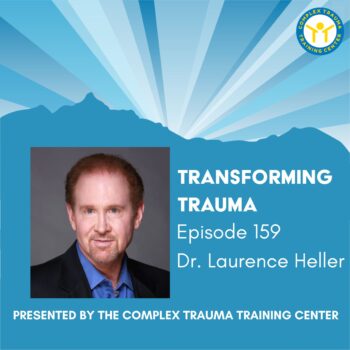Transforming Trauma Episode 159: Letting Go of Shame That Isn’t Yours with Dr. Laurence Heller
A podcast brought to you by the Complex Trauma Training Center
For all its popularity as a talking point, shame remains one of the least-documented human emotions. While shame has become a hot topic for debate, one psychologist believes that shame is a much more dynamic emotion than we realize, functioning as both a symptom and strategy. When we consider shame in adulthood, the emotion becomes less of a noun or something that our younger selves were given and more of a verb, behaviors we can safely scrutinize and ultimately assert agency over.
On this episode of Transforming Trauma, host Emily Ruth is pleased to welcome back Dr. Laurence Heller, Ph.D., author, international trainer, and creator of the NeuroAffective Relational Model® (NARM®). The pair discuss the psychology of shame and its significant role in protecting attachments (or relationships) starting at a young age. This conversation also explores the benefits of a NARM-focused approach to shame and its impact on patients’ personal agency, relationships, and quality of life. They also examine how shame, the emotion, informs behavioral patterns and how accessing anger can ultimately diffuse shame-based identifications.
“In recent years, I’ve just been seeing the importance of the theme of shame,” Dr. Heller begins. “Brené Brown’s work on shame was a really good start and very useful. She talks about the vulnerability that’s underneath shame. I agree, but there’s so much more to the role that shame plays in our lives.” While most folks, understandably, take the position that shame has no utility, that it’s simply “bad,” Dr. Heller posits that shame, especially within the context of NARM, is used as a coping mechanism, a self-protective strategy developed in early childhood. “Ultimately, it’s a way of protecting the attachment relationship with, usually, the primary caregivers, or in most cases, parents,” he explains.
“When there’s significant neglect, abuse, or misattunement, one of the natural reactions on a child’s part is to be angry,” confirms Dr. Heller. That response is dangerous for a child because, from a child’s perspective, they can’t hold both anger and love for the parent. When the internal overwhelm of anger meets the external threat of a parent’s retaliation for that anger, shame rushes in to protect the child by “resolving” the issue. It’s a cycle that embeds itself early on.
“I put shame on a spectrum,” explains Dr. Heller. Shame, self-hatred, self-rejection, self-judgment, and self-sabotage all fall along this spectrum of shame. “As painful as shaming, self-hatred or self-rejection is, it feels better than the alternative––to be the unlovable child of parents who have the capacity for love, than the lovable child of parents who don’t have the capacity to love.”
Part of NARM work is to help people learn how to extend more compassion toward themselves. “But, what a lot of clinicians don’t understand is that there is a threat to becoming too compassionate to yourself because if it’s not your fault, from the child’s perspective, there’s no hope,” he cautions.
Maintaining the balance can often confuse clinicians as they desperately want their clients to realize they’re not as bad as they think. The reality is that such a perspective threatens the adult-child relationship on an unconscious level. “It’s so helpful, clinically, for people who are blaming, shaming, or criticizing themselves to see that it’s not just something that happens,” he says. “You’re not just attacked by shame. It’s playing a role in the overall ecology of your personality.”
Transforming Trauma is always grateful to Dr. Heller for sharing his time and vast expertise with us. Our community is a wiser and more empathetic space, thanks, in part, to the way Dr. Heller models mentoring and mindfulness.
RECOMMENDED EPISODES
NARM Inner Circle Presents: NARM & Heartfulness with Dr. Laurence Heller and Brad Kammer
MENTIONED IN THIS EPISODE
Crash Course: A Self-Healing Guide to Auto Accident Trauma and Recovery
GUEST CONTACT & BIO
Dr. Laurence Heller is the creator of the NeuroAffective Relational Model® (NARM®), international trainer, and co-author of Healing Developmental Trauma: How Early Trauma Affects Self-Regulation, Self-Image and the Capacity for Relationship and Crash Course: A Self-Healing Guide to Auto Accident Trauma and Recovery. Dr. Heller co-authored, with CTTC Training Director Brad Kammer, The Practical Guide for Healing Developmental Trauma: Using the NeuroAffective Relational Model to Address Adverse Childhood Experiences and Resolve Complex Trauma which presents one of the first comprehensive therapeutic models for addressing complex post-traumatic stress disorder (C-PTSD), introducing an integrated mind-body approach for treating attachment, relational, cultural and intergenerational trauma. Dr. Heller’s forthcoming book, co-authored with Stephan Konrad Niederwieser, is untitled at the time of this podcast’s release.
Dr. Heller is the Founder & Director of the NARM Training Institute and teaches regularly in the US and Europe.

Subscribe for All Episodes
on your Favorite Service:
We want to connect with you!
Facebook @ComplexTraumaTrainingCenter
Twitter @CTTC_Training
YouTube
Instagram @cttc_training
Learn more about The Complex Trauma Training Center: http://www.complextraumatrainingcenter.com